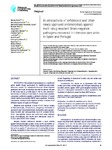In vitro activity of cefiderocol and other newly approved antimicrobials against multi-drug resistant Gram-negative pathogens recovered in intensive care units in Spain and Portugal

View/
Use this link to cite
http://hdl.handle.net/2183/41017
Except where otherwise noted, this item's license is described as Creative Commons Attribution-NonCommercial 4.0 International License
Collections
- Investigación (FFISIO) [483]
Metadata
Show full item recordTitle
In vitro activity of cefiderocol and other newly approved antimicrobials against multi-drug resistant Gram-negative pathogens recovered in intensive care units in Spain and PortugalAuthor(s)
Date
2023-10-26Citation
Gijón D, García-Castillo J, Fernández-López MC, Bou G, Siller M, Calvo-Montes J, Pitart C, Vila J, Torno N, Gimeno C, Cruz H, Ramos H, Mulet X, Oliver A, Ruiz-Garbajosa P, Canton R. In vitro activity of cefiderocol and other newly approved antimicrobials against multi-drug resistant Gram-negative pathogens recovered in intensive care units in Spain and Portugal. Rev Esp Quimioter. 2024 Feb;37(1):69-77.
Abstract
[Abstract]
Objective: The antimicrobial resistance is a significant public health threat, particularly for healthcare-associated infections caused by carbapenem-resistant Gram-negative pathogens which are increasingly reported worldwide. The aim of this study was to provide data on the in vitro antimicrobial activity of cefiderocol and that of commercially available comparator antibiotics against a defined collection of recent clinical multi-drug resistant (MDR) microorganisms, including carbapenem resistant Gram-negative bacteria collected from different regions in Spain and Portugal.
Methods: A total of 477 clinical isolates of Enterobacterales, Pseudomonas aeruginosa, Acinetobacter baumannii and Stenotrophomonas maltophilia were prospectively (n=265) and retrospectively (n=212) included (2016-2019). Susceptibility testing was performed using standard broad microdilution and results were interpreted using CLSI-2021 and EUCAST-2021 criteria.
Results: Overall, cefiderocol showed a good activity against Enterobacterales isolates, being 99.5% susceptible by CLSI and 94.5% by EUCAST criteria. It also demonstrated excellent activity against P. aeruginosa and S. maltophilia isolates, all being susceptible to this compound considering CLSI breakpoints. Regarding A. baumannii (n=64), only one isolate was resistant to cefiderocol.
Conclusions: Our results are in agreement with other studies performed outside Spain and Portugal highlighting its excellent activity against MDR gram-negative bacteria. Cefiderocol is a therapeutic alternative to those available for the treatment of infections caused by these MDR bacteria.
Keywords
Gram-negative pathogens
Carbapenemase
Cefiderocol
Multidrug resistant
Siderophore cephalosporin
Carbapenemase
Cefiderocol
Multidrug resistant
Siderophore cephalosporin
Editor version
Rights
Creative Commons Attribution-NonCommercial 4.0 International License
ISSN
0214-3429






